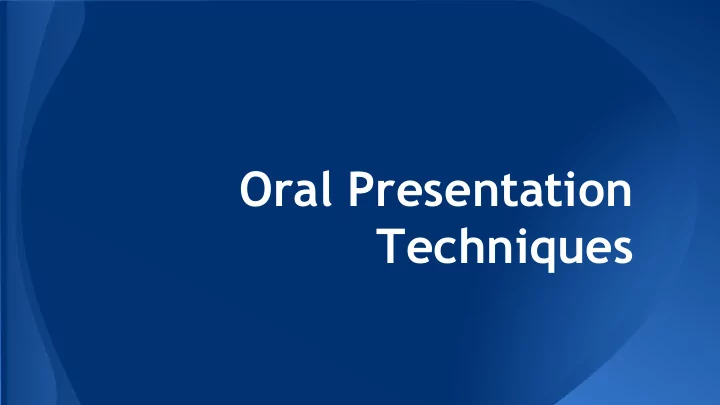

Oral Presentation Techniques
Listening Skills
In-class listening skills ● Take notes on important information ● Know why you’re listening ● Listen for facts/details ● Put the lecture into your own words
Good listeners... THINK about what is being said
Practice with Jr. Scholastic articles
Speaking Skills
Speaking skills ● Speak loudly and clearly ● Maintain eye contact ● Emphasize main ideas with tone and volume ● Use nonverbal techniques to maintain the attention of your audience
Types of Speech
Explanatory provides information about or an explanation of an idea, object, or event
Persuasive the speaker attempts to get the audience to agree with a point of view or perform some kind of action
Entertaining given to amuse the audience
Rhetorical Device
A rhetorical device uses words in a certain way to convey meaning or to persuade. It can also be a technique to evoke an emotion on the part of the reader or audience.
Alliteration ● repetition of the same beginning sound She sells seashells by the seashore. http://www.americanrhetoric.com/mp3clips/figures/dragnetalliteration.mp3
Allusion ● a reference to an event, literary work or person I can’t do that because I am not Superman. http://www.americanrhetoric.com/mp3clips/figures/georgewbushallusion.mp3
Anaphora ● repetition of a word or phrase at the beginning of successive phrases " We shall go on to the end, we shall fight in France, we shall fight on the seas and oceans, we shall fight with growing confidence and growing strength in the air, we shall defend our Island, whatever the cost may be, we shall fight on the beaches, we shall fight on the landing grounds, we shall fight in the fields and in the streets, we shall fight in the hills; we shall never surrender." (Winston Churchill, speech to the House of Commons, June 4, 1940) http://www.americanrhetoric.com/mp3clips/figures/rfkanaphora.mp3
Antithesis ● contrast of ideas or words in a parallel structure “Ask not what your country can do for you, ask what you can do for your country.” JFK “That’s one small step for a man, one giant leap for mankind.” Neil Armstrong http://www.americanrhetoric.com/mp3clips/figures/neilarmstrongantithesis.mp3
Chiasmus ● two or more clauses are balanced against each other by the reversal of their structures in order to produce an artistic effect; criss-cross “Never let a Fool Kiss You or a Kiss Fool You.”
Parallelism ● the arrangement of words, phrases, clauses, or larger structures placed side by side, making them similar in form “It was the best of times, it was the worst of times, it was the age of wisdom, it was the age of foolishness, it was the epoch of belief, it was the epoch of incredulity, it was the season of Light, it was the season of Darkness, it was the spring of hope, it was the winter of despair.” A Tale of Two Cities by Charles Dickens http://www.americanrhetoric.com/mp3clips/figures/abelincolnparallelism.mp3
Repetition ● a word or phrase used two or more times in close proximity I have a dream that one day down in Alabama, with its vicious racists, with its governor having his lips dripping with the words of interposition and nullification – one day right there in Alabama little black boys and black girls will be able to join hands with little white boys and white girls as sisters and brothers. I have a dream today. I have a dream that one day every valley shall be exalted and every hill and mountain shall be made low, the rough places will be made plain, and the crooked places will be made straight, and the glory of the Lord shall be revealed and all flesh shall see it together. - MLK, Jr.
Speakers can... ● use emotion-arousing words ● use fear ● use references to the past
A good argument will have... Logos, Ethos, Pathos
Logos logical argument an appeal to logic or reason
Ethos appeals based on the reliability, credibility, or expertise of the writer or speaker
Pathos appeals to the audience’s needs, values or emotions
Recommend
More recommend